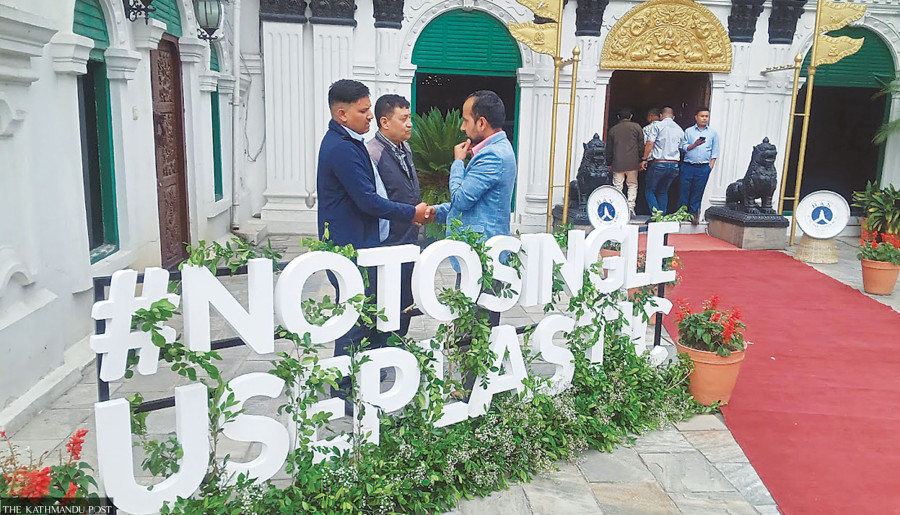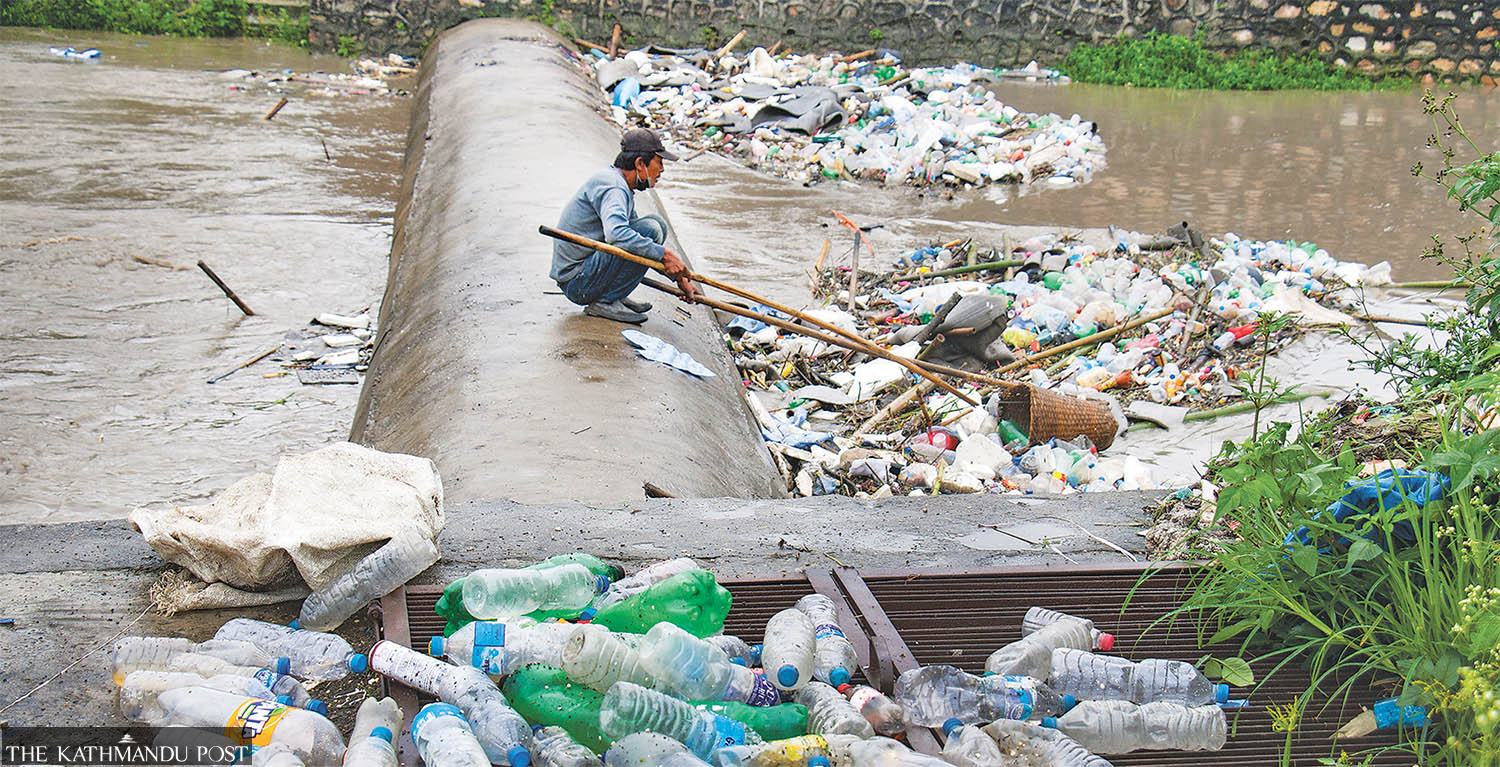Money
Hotels to ban single-use plastics in green push
Water bottles, drinking straws, cutlery, plates, drink stirrers, expanded polystyrene food service products, toothbrushes and combs will be out from 2025.
Sangam Prasain
Nepal’s hotels have decided to ban single-use plastics from 2025 and join the fight against plastic pollution and promote sustainable tourism.
Hotel Association Nepal announced on Wednesday that all types of throwaway plastics—water bottles, drinking straws, cutlery, plates, drink stirrers, expanded polystyrene food service products, toothbrushes and combs—would be prohibited at all its 3,000 member establishments across the country starting January 1, 2025.
Most luxury hotels have already been implementing the policy. Single-use plastics are designed to be used once and thrown away.
“We have started the campaign to eliminate single-use plastics from hotel rooms and promote eco-friendly products for green hospitality in the hotel industry,” said Sreejana Rana, president of Hotel Association Nepal.
“Plastic is one of the most important innovations of our time, but single-use plastic has a severe impact on the environment. Plastic is a convenient comfort in today’s world because of its inexpensive production cost and wide range of applications,” said Rana.
“At the same time, the disposable nature of these single-use products contributes to one of the most significant sources of pollution in our ecosystem.”
The impacts of this plastic waste on the environment and people’s health are global and can be drastic. Single-use plastic products are more likely to end up in rivers than reusable options.
Plastic is a non-biodegradable material and most plastic is made from fossil fuels. If burnt, it poisons the air; if buried, it pollutes the soil. And plastic wastes dumped haphazardly have been clogging sewer mains and rivers and polluting the oceans.
Nepal still does not have effective waste recycling plants although several private firms have been recycling solid waste and producing compost manure on a small scale.
According to an Asian Development Bank report, a waste composition analysis in Nepal indicates that the highest waste fraction is organic matter (66 percent), followed by plastics (12 percent), paper and paper products (9 percent), others (5 percent) and glass (3 percent). Metal, textiles, and rubber and leather each accounted for 2 percent or less.
The most commonly found single-use plastic items in Nepal are plastic drinking bottles littering rivers and rivulets. Plastic has also climbed the mountain regions polluting freshwater from the snow-capped mountain due to the increasing number of mountain climbers, mostly on the world’s highest peak Mt Everest.
The International Centre for Integrated Mountain Development (ICIMOD) said in its report that Kathmandu alone uses around 4.7 million to 4.8 million plastic bags daily. In Nepal, 16 percent of urban waste consists of plastic, which is 2.7 tonnes of daily plastic garbage production, it said.
“And this is just Kathmandu. When you look at the global level, the data is staggering. Researchers claim humans have produced 9.1 billion tonnes of plastic so far, and much of it ends up in nature—causing harm to both living beings and the environment.”
Besides the sheer quantity of plastic waste being produced, one of the major problems with plastic is its resistance to degradation, ICIMOD said. A conservative estimate puts the average time for one single plastic bag to completely biodegrade at 500 years, it said.
“This means that not only most of the plastic we use during our lives will outlive us, but that our plastic footprint also will affect the generations to come.”

A huge amount of plastic finds its way into river systems, and eventually into the global ocean ecology.
Sunita Dangol, the newly elected deputy mayor of Kathmandu Metropolitan City, said the announcement of the hotel industry banning single-use plastics was an exemplary initiative taken by the private sector.
“It’s a small initiative but it has a huge impact,” she said. “Though Nepal had announced it was a plastic-free country in 2015, it has not been effective. But we are moving in the direction of a sustainable environment. We have to do this. The hotels are beginning from their rooms. Let’s begin from our rooms,” she said.
“We still have a long way to go to achieve the goal of zero plastic waste. All have to contribute to this initiative.”
According to ICIMOD, the Hindu Kush Himalaya covering the connected mountains of eight countries—Afghanistan, Bangladesh, Bhutan, China, India, Myanmar, Nepal and Pakistan—are the source of 10 great rivers that provide drinking water, irrigation, hydropower and life, and eventually, reach the oceans.
The flow of water from the Himalaya to the oceans also carries plastics and solid waste, posing a threat to both ecosystems and people in the mountains, plains and seas.
In Nepal, plastic waste is well known for clogging the rivers and streams in the mountains and hills, resulting in flash floods. The impact of what is done in the mountains is also felt downstream. In fact, like Kathmandu, most of the urban centres in the Hindu Kush Himalaya region are flooded with solid waste, including plastics.
“The 12 Indian Himalayan states are generating as much as 22,372 tonnes of municipal waste daily. With increased connectivity, more plastics find their way to mountain shops, and more tourists add to the demand and use of plastics,” ICIMOD said.
If recycling of plastic and control mechanisms do not keep pace with the production rate of single-use plastic, researchers have estimated that the world will end up with 13 billion tonnes—the equivalent of about 30,000 fully loaded supertankers—of plastic by 2050.
In April 2015, Nepal declared Kathmandu a polythene bag-free zone. Several other areas have followed suit and declared themselves plastic-free, including Parbat, Myagdi, Damak and Ilam.
Plastic bans in urban mountain centres like Gangtok and Nainital in India in the late 1990s have demonstrated that daily life is equally comfortable with reduced plastics, according to ICIMOD.
British Ambassador to Nepal Nicola Pollitt said the announcement made by the hotel industry is a welcome initiative to protect the diversity of Nepal.
The hotel industry in Nepal is hugely influential, and this kind of initiative, although takes time and money, will benefit the country and its environment, she said.
“Tourists in Nepal will feel the change.”
Since January 2020, the Everest region, which has gained notoriety as the "world’s highest garbage dump", imposed a ban on the use of plastic bags, bottles and other plastic items, citing their adverse effects on human health.
The use of plastic bags of less than 30 microns has been prohibited.
The Everest region has long been struggling to manage the solid waste that visitors to the region bring along every year.
Hundreds of mountaineers, Sherpas, guides and other high altitude porters en route to Everest leave behind tonnes of both biodegradable and non-biodegradable wastes that include empty oxygen canisters, bottles, ropes, kitchen waste and faecal matter, polluting the area and settlements downstream.
The government rule for every climber to bring back at least 8 kgs of garbage—the amount of trash estimated to be produced by one climber on average—has remained mostly ineffective.
In 2019, Nepal’s first national park, Chitwan National Park, had declared itself to be the country’s first plastic-free protected area.
Plastic is one of the biggest contributors to government revenue. In fiscal year 2020-21, Nepal imported plastic and its products worth Rs63 billion, according to the Department of Customs.
The government collected Rs16.47 billion in taxes from plastic.
"Plastic bans have positive impacts not only on the environment but also on the economy," said Tara Nath Adhikari, director general of the Department of Tourism.
“Banning single-use plastic will create jobs because demand for Nepali products, particularly handmade, will grow. It’s crucial to ban plastic if we envisage green development which is sustainable.”




 9.7°C Kathmandu
9.7°C Kathmandu















